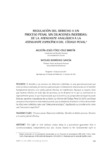Regulación del derecho a un proceso penal sin dilaciones indebidas: de la atenuante analógica a la atenuante específica del código penal

View/
Use this link to cite
http://hdl.handle.net/2183/10350Collections
Metadata
Show full item recordTitle
Regulación del derecho a un proceso penal sin dilaciones indebidas: de la atenuante analógica a la atenuante específica del código penalDate
2011Citation
Anuario da Facultade de Dereito da Universidade da Coruña, 2011, 15: 555-576. ISSN: 1138-039X
Abstract
[Resumen] El derecho a un proceso sin dilaciones indebidas es una garantía procesal que
está constitucionalizada, de manera autónoma pero íntimamente relacionada con el también
fundamental derecho a la tutela judicial efectiva sin indefensión. Aunque su respeto tiene
que hacerse efectivo en todo tipo de procesos, es en el penal en el que su vulneración es
especialmente grave, lo que ha provocado que la doctrina y la jurisprudencia hayan buscado
diversas opciones reparadoras de su lesión. La reforma del Código Penal de 2010 constituye
un avance importante en esta materia puesto que se abandona el anterior criterio de entender
las dilaciones indebidas como una “atenuante analógica”, legalizando su consideración como
una “atenuante específica”. [Abstract] The right to trial without undue delay is a procedural guarantee that is
constitutionalized, independently but also closely related to the fundamental right to effective judicial guidance without helplessness. Although this must be respected in all types
of procedures, their violation is particularly serious in criminal ones and this has prompted
the doctrine and jurisprudence to seek various remedial options for its breach. The Penal
Code of 2010 constitutes an important advance in this matter since it leaves behind the
former criterion to understand undue delay as a mitigating factor analogue, legalizing their
consideration as a specific mitigating factor
Keywords
Proceso penal
Dilaciones indebidas
Derecho al debido proceso
Tutela judicial efectiva
Criminal process
Undue delay
Right to due process
Effective judicial guidance
Dilaciones indebidas
Derecho al debido proceso
Tutela judicial efectiva
Criminal process
Undue delay
Right to due process
Effective judicial guidance
ISSN
1138-039X





